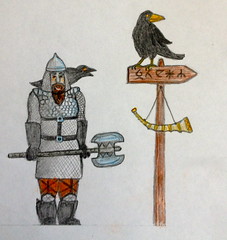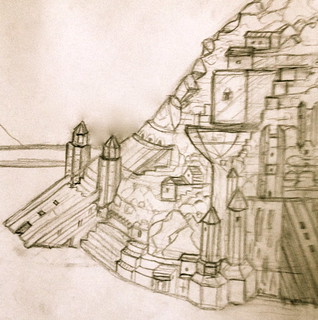Dwarves
The M'Gar are much more than the delvers they are characterized as. Historical challenges have forced them to diversify what they do and how they relate to the world. The language they use is also called M'Gar. They are called 'Dwarves' in Eriman and 'Karzelek' in Planavic. Adventuring Dwarves can become Warriors, Thieves and Clerics (known as Balthar which translates as 'Ancestral Envoy'). Only Half-Dwarves can become 'Spellsmith' Mages.

Description
Fully grown Dwarves are between 4' to 4'8" tall and weigh 83 to 200 pounds. They tend to stocky in form and homely of face. They have course hair of brown to black (shading to grey with age) and grey, brown or ochre irises. They can live to almost 250 years. They have exceptional resistance to toxins (so that Fatal ones are only Severe and Severe ones only Mild). Dwarvish temperament can be stolid and taciturn with bursts of more lively emotion. They prefer to live in hilly or even mountainous areas within a temperate climate. Dwarves are most refreshed by one very long sleep each night (spending half a lifetime in slumber overall).
Culture
The Dwarves venerate ancient ancestors who serve as role-models and the champions of tales told to instil a sense of pride and determination. The spirits of these ancestors are regarded as divine and Dwarven religion holds that they are reincarnated from those same spirits. They cannot tell who they will next become and so the old and rich are advised to be generous to the poor and youthful. Dwarves put value in stability and structure and the habits of the past are elevated to the status of sacred rites in the present. It is this sameness that has been both a boon and a handicap.
Dwarves have a very structured and orderly society inspired by rigid military strategy. Both the nobility and commoners are connected by loyalty to wider society and within it to particular professions such as miner, stonemason and blacksmith. Mineral riches were always important to the Dwarvish empire of the past. The gold and silver of the Seven Hills combined with the copper of the south-western foothills of the Pillar Mountains and the iron of Mount Hammer gave the Dwarves power and riches far beyond what the population warranted. The lowlands between these areas were regarded as a burden to be traversed and left fallow. Ravens were domesticated to provide a communication network for Dwarves who preferred to stay at home.
Over time the ore was exhausted in the shallower mines and newer mines were more difficult to dig. This combined with hostile incursions into Dwarvish territory forced a concentrating of armed forces and workers in the heartland of the Seven Hills. Dwarvish nature and custom produced a slowly dwindling and aging population over time.
Some enterprising Dwarves explored new ways of supporting themselves by trading with Humans and focusing on offering skills and expertly crafted items. Dwarves of such a temperament re-populated and revived the territory of Mount Hammer with such methods and also opened new mines in the Iron Mountains. Many others however stayed in the stagnating community of the Seven Hills. A sudden invasion of Hill Giants utterly destroyed that society and killed the Dwarvish Monarch.
Since then there has been both a Dwarvish Monarch-In-Exile and a newly declared Monarch of Mount Hammer. A distinction exists between the Holemgar (Hill Dwarves) who live scattered and seek to re-take the Seven Hills (whose home base is the Fugitives Forge south-west of the Pillar Mountains) and the Karumgar (Mountain Dwarves) of the Iron Mountains. They can live together but never can agree on the feasibility of re-taking the homeland.
Technology
Dwarves excel in the extraction and working of metals and minerals, the carving and excavating of stone, and the construction of mechanisms to assist in such work. Many generations within a given family will specialize in the same skill and those professions that produce lasting works are the most respected. A mason is much more valued than a shepherd (even if these exist still in the foothills). However in more recent times newer skills of trading and investment have helped some Dwarves make a fortune. Both the old and the newer professions are deemed to be technical in nature and it is in technical matters that Dwarves focus.
Dwarvish designs emphasize functionality. Houses are rambling stone structures of split-levels embedded into hillsides. All is rigid and precise angles inspired by the geometry of gemstones and sedimentary stone. Art is abstract and barely even noticed as it forms part of the objects into which it is incorporated. Dwarvish music is precise and premeditated and played using lithophones and gongs. It is composed in such a way that its reverberation in a cavern or hall produces the intended number of notes. The most amazing products of Dwarvish skill are statuesque automatons constructed by spell-casters in collaboration with artisans.

Clothes
The Hill Dwarf militia wear chain mail and wield battle-axes (offensive) and twin throwing axes (defensive) - these axes have a characteristic twin-bladed design Dwarves are adept at wielding. The Mountain Dwarf militia of Mount Hammer wear scale mail and wield short sword and shield (offensive) and cross bow incorporating an embedded dagger (defensive). Dwarvish military commanders wear plate mail and wield same weapons as the troops they accompany. Balthar clerics accompanying the troops wear the same armour as the troops but wield war hammers or military picks (which are deemed holy). Civilians tend to wear practical and long-lasting clothes of thick cloth and enduring leather. Decoration is minimalist. Pigments are derived from minerals and include rust-red and patina-green.
Food
Dwarves enjoy food and lots of it. Of particular importance are bread and beer which tend to be made by the same persons using similar skills and ingredients. For dwarves a bakery and a brewery are the same thing and one foodstuff is the perfect compliment for the other. Dwarves also enjoy the flesh of both goats and sheep and make a variety of stews and casseroles from these. They also make cheeses and yoghurts from goat or sheep milk. Both breeds are farmed together - goats tend to offer sheep some defence from predators - and Humans are hired to do much of this work. Salts in a variety of colours are prized as seasoning and Dwarves say each colour has its own distinct taste and trace nutrients. Dwarves seem to survive despite an absence of fruit or vegetables.
Reproduction
In Dwarves libido is scant and can be sublimated to the value of the arranged marriages that are the norm in Dwarven society (fostering commerce between households and ensuring ancestral lines). Such arrangements are never challenged by demands of passion that sometimes complicate life for Humans. The lifelong bond between two Dwarvish spouses is very similar to the love of friends and comrades-in-arms rather than romantic love. However the love parents hold for Dwarvish children is among the most powerful (in part because Dwarves tend to only have one or two literal family jewels who are precious to them).
Gestation takes 12 months and once born a baby is robust and can crawl immediately. Only one child is ever born at a time. Note that Dwarves living among Humans will tend to adopt a bawdy sense of humour at odds with their lack of interest in sex. This they do as a way of both fitting in with and lampooning Humans.
While both male and female Dwarves can practice any profession there is some discrimination in combat - men become offensive troopers while women become defensive guards of whatever rank. Some dwarves think this is a foolish demarcation.

Half-Dwarves
Dwarves and Humans can have children but this is a very rare incident (often involving too much drink). Any resulting child (only one at a time is ever born) is effectively a Dwarf (of maximum Dwarish size and base Dwarvish lifespan only) with only one additional characteristic - they are themselves sterile. Such Dwarves will tend to throw themselves into the work of creating the best items of craft since they cannot have children. Only Half-Dwarves can become Spellsmiths who make magical items for the nobility.


<< Home